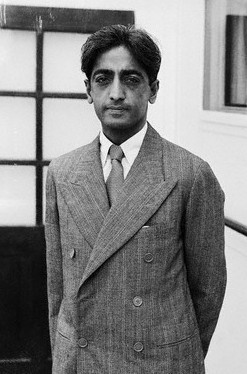|

|
- One has to be choicelessly attentive,
fully aware; and this state of choiceless attention is meditation.
- If you observe your own mind in what you
call meditation, you will see that there is always a division, a
contradiction between the thinker and the thought. As long as there
is a thinker apart from thought, meditation is merely a ceaseless
effort to overcome this contradiction.
- Is there a new experience in
meditation? The desire for
experience, the higher experience which is beyond and
above the daily or the commonplace, is what
keeps the well-spring empty. The craving for more experience, for
visions, for higher perception, for some realization or other, makes
the mind look outward, which is no different from its dependence on
environment and people. The curious part of meditation is that an
event is not made into an experience. It is there, like a new star
in the heavens, without memory taking it over and holding it,
without the habitual process of recognition and response in terms of
like and dislike. Our search is always outgoing; the mind seeking
any experience is outgoing. Inward-going is not a search at all; it
is perceiving. Response is always repetitive, for it comes always
from the same bank of memory.
- To concentrate is not to meditate, even
though that is what most of you do, calling it meditation. And if
concentration is not meditation, then what is? Surely, meditation is
to understand every thought that comes into being, and not to dwell
upon one particular thought; it is to invite all thoughts so that
you understand the whole process of thinking.
- Awareness is observation without choice,
condemnation, or justification. Awareness is silent observation from
which there arises understanding without the experiencer and the
experienced. In this awareness, which is passive, the problem or the
cause is given an opportunity to unfold itself and so give its full
significance. In awareness there is no end in view to be gained, and
there is no becoming, the 'me' and the 'mine' not being given the
continuity.
- To understand what this self-centred
activity is, one must obviously examine it, look at it, be aware of
the entire process. If one can be aware of it, then there is the
possibility of its dissolution; but to be aware of it requires a
certain understanding, a certain intention to face the thing as it
is and not to interpret, not to modify, not to condemn it.
- Meditation must enter into every corner of
our life.
- Meditation is a process of understanding.
Understanding is not a result and it is not something you gain. It
is a process of self-discovery. That means meditation is an
awareness of your whole process of living. Meditation is a process
of understanding, the process of your whole being, not only a part
of it, and that means that you have to be aware of everything that
you are doing. it is not concentration. You take a picture and you
focus your attention on that.
- All this is implied in meditation - to be
aware, to be conscious of your environment, to be aware how you
talk, how you walk, how you eat, what you eat; to be aware how you
speak to another, how you treat another, as you are sitting there,
to be aware of your neighbour, the colour of the coat, the way he
looks. Without criticism just be aware. That gives you great
sensitivity, empathy, so that your body is subtle, sensitive, aware
of everything that is going on around you. To be aware without any
choice, see where you are, looking at the speaker, looking all
around you without a single choice, just look - to be aware.
- When you learn about yourself, watch
yourself, watch the way you walk, how you eat, what you say, the
gossip, the hate, the jealousy - if you are aware of all that in
yourself, without any choice, that is part of meditation. So
meditation can take place when you are sitting in a bus or walking
in the woods full of light and shadows, or listening to the singing
of birds or looking at the face of your wife or child.
- Happiness and pleasure you can buy in any
market at a price. But bliss you cannot buy for yourself or for
another. Happiness and pleasure are time-binding. Only in total
freedom does bliss exist. Pleasure, like happiness, you can seek,
and find, in many ways. But they come, and go. Bliss that strange
sense of joy has no motive. You cannot possibly seek it. Once it is
there, depending on the quality of your mind, it remains timeless,
causeless, and a thing that is not measurable by time.
Meditation is not the pursuit of pleasure and the search for
happiness. Meditation, on the contrary, is a
state of mind in which there is no concept or formula, and therefore
total freedom. It is only to such a mind that this bliss comes
unsought and uninvited. Once it is there, though you may live in the
world with all its noise, pleasure and brutality, they will not
touch that mind. Once it is there, conflict has ceased. But the
ending of conflict is not necessarily the total freedom. Meditation
is a movement of the mind in this freedom. In this explosion of
bliss the eyes are made innocent, and love is then benediction
- Meditation demands a mind that is not
caught in any system, however romantic, however pleasing, however
desirable.
^Top
Back to Krishnamurti Meditation |
|
